The Tragedy That is Gambia’s Political Football
A visit to RIV Golf Estate
RIV Golf Estate built by Gambian born real estate property developer Mustapha Njie, (Taf) is sheltering hundreds of people in Port Harcourt, Nigeria.
Here we bring you an interview The FatuNetwork had with the Regional Manager, Assan Sosseh.
Teachers to go on strike next Friday if…….
The National Executive Committee of the Gambia Teachers Union has threatened to embark on a sit-down strike if their demands on issues affecting teachers’ welfare are not met by mid-day of 7th September.
They are demanding for an increment of house rent allowance and timely payment of salaries of newly qualified teachers among issues which are not remedied.
Essa Sowe, the General Secretary of Gambia Teachers Union told a press conference that the government ignored all the demands that were forwarded to them on 2nd March, 2018.
According to him, they are compel to go on strike because the government has failed to come with solutions.
For Sowe, the residential and house rent allowances of teachers in the provinces should be increased as soon as possible to D1, 000 since those teaching within the Greater-Banjul Area are benefitting from Transport allowance.
Sowe say the school improvement grant-arrears have to be paid and that government needs to bring reforms to schools especially Senior Secondary School, failure of which will result to further actions.
The Principal of Bottrop Senior School, Martin Gomez is the President of GTU. The Teachers’ Union, according to the former St. Augustine’s High School Principal, will not tolerate the continual obstacles that teachers are encountering.
FABB And The $752,000: How Long Will The Investigation Take?
The Fatou Bah Barrow Foundation (FABB) is still tight lipped on the state of investigation board members say they are currently engaged in over the $752,592.42 paid into the foundation’s account by TBEA Company Ltd.
TBEA is a Chinese manufacturer of power transformers and a developer of transmission projects. It has been gathered that The Gambia Government through the Ministry of Energy and The National Water & Electricity Comapany (NAWEC) are on the verge of giving the country’s transmission and distribution project to TBEA.
A credible source from a financial institution told The Fatu Network that there is no way The First Lady could say that she knows nothing about the transaction.
Well, The First Lady and her aunt one Aminata Jallow ‘Marimo’ signed off on the transfer of $742,211.13 to White Airways, a Portuguese charter airline on the same day the money was deposited into the foundation’s account. How can that happend if they do not know about the transaction? The source asked.
Following investigations, The Fatu Network found out that the foundation has three signatories, The First Lady, Fatou Ceesay and Aminata Jallow. What we found interesting is that for this particular transaction, only The First Lady and Aminata Jallow signed for the transfer of funds to White Airways for a charter flight that never was. What happened to the $742,211.13 sent to Portugal is still a misery.
Despite comments by the foundation’s acting CEO, Fatou Ceesay that they do not how the money made its way into their account, The First Lady’s aunt, Aminata Jallow first claimed that the $752,592.42 was sent in from Beirut for her business. She was said to have insisted on that until a telext report was shown to her that the money actually came from Honkong, China.
‘Aminata then insisted that the balance of the money in the account should be paid to her, but the board did not approve her request’ A source said.
The source added that after the first board meeting was conducted about the huge transfer, The First Lady promised at the meeting that she was going to discuss the issue with the President but never got back to them.
The multi millon dollar question is, does The President know about this transaction or is it between The First Lady and her aunt, Aminata Jallow? Our investigations into the matter will continue.
When Will The Rains Stop Beating Us?
Alagi Yorro Jallow
These are very difficult times in the Gambia. Sad, mournful and dolorous times, the Gambia opened with ethnic bigotry, religious bigotry, misogynism and intolerance. Of course. Ethnic chauvinism, egotism and narcissism suddenly seemed to have enlarged itself against the nation.
Faults are thick where love is thin. There is prejudice in the country. Plenty. There is insularity, in prodigious quantity. There is animus, antipathy against anyone that is not of your ethnic or religious stock, or that belongs to a different political orientation or persuasion. If you meet him, kill him, if you can’t catch him, poison his footsteps, seems to be the singsong among some Gambians.
It confirmed, yet again, that Gambians — that we do hate each other. Why do we allowed to be become victims of the unending political manipulation of ethnic and religious identities for selfish gain? Evidently, ordinary Gambians have the “Gambian spirit” in their DNA.
There are extremists and chauvinists from across religions and in ethnic linguistic groupings. I am yet to hear anyone declare that we were not created by the same God. One of the most astonishing things about life, to me, is the fact that although we can choose to be Muslims or Christians, and so on, nobody can choose to be Fulani, Jola, Mandinka, Serere, Sarahule, Aku, and Wolof or whatever. We just woke up one day to find ourselves as members of one ethnic group or the other. It was not our making.
So why should we discriminate against each other, and hate others, based on an ethnic identity that is beyond their control? Is it their fault that they were born into a family that was clearly not their choice?
Today, we must be practical on how we can renew our minds. There is a saying that Rome was not built in a day, a proverb originated by the 19th century English playwright, John Heywood, who also gave us immortal expressions such as “out of sight out of mind”, “better late than never”, and “the more the merrier”. He said Rome wasn’t built in a day “but they were laying bricks every hour”.
This, in some sense, tells us the value of consistent hard work, perseverance and conscious efforts at construction. If Gambia is going to change, therefore, they must alienate those who see themselves, first and foremost, as ethno-religious champions. It all starts in the mind.
But pardon me, Rome was not destroyed in a day either. It took ages to build the city but took a much shorter time to destroy it. Rome was sacked by the Visigoths in 410 AD. In three days, they looted, burnt and wrecked the beautiful city. That hastened the collapse of the Roman Empire. Same thing applies here: the destruction of Gambia by ethnic champions and religious bigots will not happen in one day — it is a gradual, steady process. That is why we the people must guard our hearts jealously before we are recruited into the hate brigade under different guises. Those already recruited can decide to desert straightaway. We need to build, not destroy.
My suggestions. To start with, do not participate in the sharing of messages and materials that are clearly intended to preach hate and prejudice. Saying “shared as received” is pure hypocrisy. You can be critical of leadership without attacking or disparaging their religions and ethnic origins. As a matter of principle, I do not share messages that are clearly meant to spread hate. It is a duty I owe my conscience. We all have terrible things to say about other people. If we do not allow love to guard our hearts, we will keep adding fuel to fire. Therefore, before you press the “send” or “forward” button, ask yourself: what is my motive? Unto thyself, be honest.
Also, do not feed your children with hate and prejudice. Fill their hearts with edifying things. A senior colleague of mine, a Muslim, married a Christian, who then converted to Islam. He told me he once engaged the services of an Oustazz to teach his children the Qur’an every Sunday. One day, he overheard the Oustazz telling the children not to drink from the same cup or eat from the same plate with their aunts, who were living with them, because they were “infidels”. My colleague fired the “Oustazz” on the spot. He remains a devout Muslim, sure, but he saw danger and immediately quenched it. This kind of hate messaging certainly fueled the mindset that birthed ethno-linguistic Chauvinism.
This is how hate works: it focuses on what divides us rather than what unites us. There are Qur’anic verses that say Muslims should love and care for Christians, the hate merchants will focus on where Christians are called “Infidels or Kafirr”. There are verses in the Bible that say, “love your neighbor as yourself”, the messengers of hate will focus on “what fellowship does light have with darkness?” There is nothing you want to justify with the scriptures that you won’t find. If you truly have love in your heart, you will focus on the verses of love. The God that forbade eating four-footed creatures is the same God that ordered Apostle Peter, in a trance, to kill and eat! To the pure all things are pure.
It is very difficult to resist the message of hate and prejudice in a society already polluted by manipulative politicians, their overpaid sidekicks and our inept leaders. I know. When everybody is saying there is casting down, it is very difficult to go against the grain and say there is lifting. You just go with the flow. But maybe the “casting down” gang is not as big as the “lifting up” brigade — just that the latter has been intimidated into silence. They must begin to speak out. Rome was not destroyed in a day. Those working to destroy the Gambia neither sleep nor slumber.
We should never feed our children with hate, prejudices and biases. These things are usually passed on from generation to generation. We should resolve to follow the example of our elders by celebrating the best in others rather than focusing on their worst.
We should rather talk about the dignity in labor we find among the Sereres, the creativity among the Wolofs and the industry among the Mandinka. Accuse them of living in denial and they will accuse you of living in bitterness. Accuse them of being politically correct and they will accuse you of being self-righteous. Accuse them of being naïve and they will accuse you of being jaundiced. It’s all in the mind.
Remembering The Great Jali Amadou “Bansang” Jobarteh
The great Jali Amadou “Bansang” Jobarteh was born before the first World War at Wuli Tambasansang in the Upper River Region, URR. He was the son of Jali Fili Jobarteh who originated from Mali. He is the grandfather of the Gambian international renown female Kora player, Sona Jobarteh.
He was also from the same father with the great grandfather of the famous Malian Singer, Sidike Diabate of the “Diabateba Music Production”.
Jali Amadou “Bansang” Jobarteh was a great oral historian and kora player of his time. He was a contemporary of the legendaries Bai Conteh, Lalo Kebba Drammeh, Alagie Bamba Suso, Fabala Kanuteh and Banna Kanuteh but the latter were much younger than him. Some of his songs were “Jula Farso”, ” Jula Jere”, “Kaira” “Lambango” but undoubtedly “Tutu Jani” was a hallmark.
He was briefly a member of The Gambia National Troupe and attended the second Manding Conference in London in the 1970s.
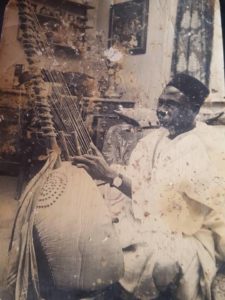
The great Jali had toured the world with WOMAD, an international art festival which is one of the biggest music industries in Europe, performing and sharing stages with world renowned artists while training students from Europe and America to play the Kora instrument at his house in Kembujeh. He also lectured for a year at the Washington University in Seattle, USA.
He received numerous Awards both local and international, including the WOMAD Festival’s “Best International Artist” that attracted artists from several countries around the world. He traveled the world extensively to Spain, Canada, New Zealand, France, Germany, England and America amongst others.
Sidia Jatta, a renowned Gambian Parliamentarian who is a founding member of PDOIS Party has strong admiration for the great Jali referring to him as a “Library” out of respect for his firm knowledge of African history.
According to Alagie Pampo Jobarteh, one of his sons who said the prominent politician would sat beside his father on a mat talking oral history and playing Kora at their family home in Kembujeh.
Jali Amadou Bansang Jobarteh had a warmth and friendly relation with the former President Dawda Kairaba Jawara, the first President of the Republic of The Gambia. He was the personal griot of the former Chief Sanjally Bojang, one of the founders of the country’s first ruling party PPP.
He was married to four women, Kumuna Sakiliba, Kachikaly Suso, Lanla Conteh and Nyima Cham with over seventeen children. His sons Sanjally Jobarteh, father of the famous Sona Jobarteh is a professional Kora player, Sankung Jobarteh is a good guitarist who played with the late Musa Ngum, Cheikh Lo and other bands while his youngest son Dawda is a very good kora player and singer in Denmark.
Jali Fili Jobarteh when he first came to the Gambia settled at Tambasansang where his dad (Amadou) was born before they moved to Sotuma Sere and then Touba Nding. The family later moved to Bansang after the demise of their father. Later, the famous Sidike Diabate’s grandfather went back to Mali where he took a wife who gave birth to Tumani, the young Sidike’s father.
Jali Amadou Bansang Jobarteh did not stay long in Bansang before he moved to Niumi Essau and later to Bakau under the then Chief of Bakau, Njagga. It was in Essau that he was given the nickname “Bansang” to distinguish him from others. He later moved to Gunjur, where he developed a strong tie of friendship with a famous merchant, Kalipha Bojang, father of Bai Bojang.
He had a farm at Nyofelleh to support his family but later went to broaden his knowledge of the Qur’an at Siffoe Kanteh Kunda. But eventually, he had to leave Siffoe after a heated political feud then his friend the late Sanjally Bojang who was a powerful political figure went to get him to stay with him in Kembujeh.
The Great Jali used to have students from Europe and America to learn the Kora from him at Kembujeh. He retired from Kora playing and singing before his death 2001. He was buried in Kembujeh.
Lethargy of corruption in The Gambia and SSHFC Decades of Institutional Decay:
Alagi Yorro Jallow
For Gambians living through these times, asking which is better between the past and the present is like asking one of the most sacred, functional relationship known to man which is better between women and wine as well as wealth. In treatment and in effect, all are the same. Either intoxicate and are very dangerous to your health — especially when taken in excess. And you can’t be more careful really. The bad stories are the same. Nothing really is new or news anymore. This is the post-news era when nothing is truly new, and nothing honestly shocks nobody again.
President Adama Barrow and his predecessors have been allegedly accused of corruption and mega sleaze. Billions stolen by big men in big places in government. These are not new things. “Time past and time present are contained in time future and time future contained in time past.” The same sad tales have always dominated our nights of dark moons.
We read of billions of Gambian Dalasis and foreign currencies missing in 1994 when Yahya Jammeh overthrew the People’s Progressive Party. We read of even more billions of hard currencies stolen too when Yahya Jammeh exiled to Equatorial Guinea by the coalition government led by Adama Barrow. Today, the government of Adama Barrow, we hear horrific tales of massive corruption and abuse of office? So, why should we be shocked when politicians eat the meat, the bones and the bones marrow. They own the future just as the past served them.
The First Lady’s Foundation Board is under investigation. The case of a mysterious bank transaction amounting to a little over $750,000 that originated from Hong Kong via the Industrial and Commercial Bank of China lodged into the account of the First Lady’s Fatoumatta Bah Barrow’s Foundation (FaBB) at the Guaranty Trust Bank in Banjul. Story, story, stories. Have you forgotten that anonymous donor to President Barrow? Which anonymous philanthropist donated 57 vehicles to Adama Barrow? Which anonymous Arab Samaritan donated D11 million Hajj package to Gambian pilgrims on behalf Adama Barrow? Didn’t we read of millions of dollars ferried directly from the vaults of the Central Bank during that period of the impasse? Can’t you remember all the sleaze and the noise and our arrogant vow that never would such happen again in this country? The big men of those eras, where are they now? They are cozying with government officials, guaranteed protection somewhere, they are in Brusubi, Kerr Sering, Manjai- Kunda and Kololi graciously getting richer, and they’ve got the real estate to prove it and add a few personal touches.
Nothing is new under the sun. Sixteen years ago, I wrote that all you need to do to know that our world has refused to move an inch from its horrid past is to just read any old newspaper, no matter its age. The headlines would always fit into any date with disturbing exactitude. Sixteen years ago, the Independent newspaper reported, the story of the day was about workers at the Social Security and Housing Finance Corporation “Protesting Bad Treatment”. Last week as the newspapers and social media reported, one of the dominant stories about Social Security and Housing Finance Corporation workers on protesting against the Managing Director? Sixteen years ago, the lead story of the Independent’s edition of November 16, 2003 was: “SSHFC Protest Bad Treatment.” You just substitute “Bad Treatment” with “Protest Against Managing Director” and you succeed in perfectly grafting the Gambia of 2003 to and 2018, The Gambia.
Another hungry, angry pensioner at that protest was one Samba Nying. Angry, hungry, hopeless, he was quoted in that report as saying: “My pain is that the SSHFC has not paid me my pension arrears. They are owing me months of pension arrears and they only started paying in April this year. What happens to the previous ones? We have borrowed money to keep the family alive. It is disappointing.” Kebba Jaw, a pensioner claimed, in that report, that his colleagues had been living on a meagre D2,000 monthly and then appealed to the then exiting Managing Director to pay their outstanding pensions as a “parting gift”. And did they get the parting gift? Does it really matter if they got anything? At least one person got paid arrears as his own parting gift, ironically, from these same disgruntled pensioners.
As I said in 2018, nothing has changed. Nothing will change. We have never really learnt any lesson and may never learn. We think every preacher has God’s anointing. We take every winged monster for an angel. We take serpents for friends. Whatever answers snake is no belt for holding trousers. What happens to the one who ties his load with a snake? We have been doing just that, scratching our itching noses with the teeth of a black mamba. Every offer made with smiles is accepted as made in good faith. It is not so. The mind of man is dark. It is darker when he comes offering to be your servant pro bono.
We are the drunk man. Never learnt anything. Even when providence saves us from a tragedy, we quickly drag ourselves into another. We give every stranger with the right smile access into our inner rooms. We take every being with a stethoscope to be a doctor. We throw out the old wisdom in not using the cassock to judge the monk. We invest in a promise that fulfills the past we are running from. Nothing will change. Hunger will stay and breed its monstrous like unless we accept this moment that the future will be the past unless we truly work hard and well to break the chains.
Gambia to Host inaugural Senegambia Volleyball Championship
The maiden Senegambia cup will be hosted by the Gambia this month following an agreement between the National Volleyball Federations of The Gambia and Senegal.
The tournament will run from September 27th to October 1st 2018 in Banjul.
Senegal’s World Cup defender Kara Mbodji has joined French top-flight side Nantes on a season-long loan with an agreed option to buy
By Omar Jarju
The 28-year-old, a product of the Diambars academy co-founded by Patrick Vieira, joined the national team from Belgian giants Anderlecht.
The French club announced: “Physically impressive and strong in tackles, Kara Mbodji will also add his talented scoring abilities and great use of his head to a strong squad under coach Miguel Cardoso.
Mbodji began his European career at the Norwegian side Tromsø in February 2010, before his impressive form led to a move to Belgian side Genk in 2012.
He helped Genk to the 2013 Belgian Cup title in his first season before rivals Anderlecht snapped him up in the summer of 2015.
An integral member of the Anderlecht squad that won the Belgian League title in 2017, Mbodji also impressed in their Belgian Super Cup triumph last year.
He managed to score seven goals in his 97 appearances with Anderlecht
At international level, Mbodji played for Senegal at under-23 level helping them qualify for the 2012 Olympics, the same year he made his senior debut against Ivory Coast.
He has five goals in 47 appearances for the Teranga Lions, including a stoppage time winner to seal Senegal’s place at the 2018 World Cup in Russia last november.
Despite a knee surgery he bounced back to make the final 23-man squad to the tournament in June, but failed to make any appearance under Aliou Cisse.
A LETTER TO MY EMPLOYER (A letter revisited with relevance to time)
Morro Krubally, UTG
Dr. Sir,
Following a view of the online video of the Sitting of Commission of Inquiry into the Financial Dealings of the Former President Jammeh, this letter is spurred by, in particular, the session with the former Director General of Social Security and Housing Finance Corporation (SSHFC), Mr. Graham. I make this analysis referencing facts delivered by the Commission and validated by Mr. Graham.
In this vein, allow me to begin my letter with these questions:
1) What is the Provident Fund, or was it Provident FRAUD? ·
2)What was the intent of creating the Fund? ·
3) Who was supposed to be the beneficiary of the Fund? ·
4) What games were played with the Fund?
5) Who really benefited from the Fund or FRAUD?
What really Obtained; if a sham is an understatement? The aim of this “letter” is to shed light on what transpired at SSHFC vis-a-vis the Provident fund, and my heart bleeds as I give this narrative.
Firstly, what is a Provident fund? According to Investopedia Academy, “A provident fund is a form of social safety net into which workers must contribute a portion of their salaries and employers must contribute on behalf of their workers.” The money in the fund is then paid out to retirees or in some cases to the disabled who cannot work.” The SSHFC provident fund was an employee retirement fund, a creative financing scheme that is no different in principle from a 401K retirement package that employers are mandated by law to offer their employees in the United States. Other civilized countries around the world may call it different names but in principle serves the same purpose of providing for a retirement package; a social security for employees. As a strategic financing scheme, if properly managed, the fund can guarantee a respite for retirees. Is this what Mr. Manjang, the embattled MD is trying to do? Has Mr. Manjang really strategized to accomplish this aim through employee buy-in? Had it not been rushed but thought out, he would have avoided, as science has shown us the predictable reaction to change is resistance. People naturally resist change and hence change management should have been thought out before forcing change down the throat of the employees.
A direct quote from the mantra of SSHFC reads: “The social security and housing finance corporation assures the Gambia populace a guaranteed social security future.” With the findings of the Commission of Inquiries, you can say with 100% certainty that this security is no more, as Yaya Jammeh has deephis hands in the cookie jar just because he could, sending many generations’ retirement security into flames/bankrupt. Is this what Mr. Manjang wants to reverse through change of policy and status quo? Noble idea, but again a good strategy may have helped to avert staff resistance to change. Show me a person who does not understand the magnitude of the Jammeh and cronies loot of SSHFC, and I will show you a sycophant or a plain ignoramus.
Secondly, what was the intent to create the Provident Fund? SSHFC was created as an Act of Parliament in 1981 with the mandate to provide social protection and shelter for Gambians. Separate from this mandate, the corporation remains an active partner in national development. The corporation prides itself with strong participation in key sectors of the national economy; health, education, agriculture and tourism etc. Under the current status quo is this possible? Again, Mr. Manage wants to right the ship but the strategy (rudder) was not well positioned.
Mr. Graham explained with pain the mission of SSHFC by elucidating with numeracy the various benefits derived from the activities of SSHFC. He was not happy that the commission only wanted to deal with the ugly side of SSHFC as it may be relevant to the Provident Fund. One of the panelist reminded Mr. Graham that they were not being judgmental but on a fact-finding mission. To SSHFC’s credit, thank you for being financially creative but the fact remains that you allowed the loot of the funds. One of the facts here states as the mission statement of SSHFC:
“The corporate mission is to provide adequate social protection for workers, facilitate social shelter delivery on a sustainable basis and invest funds of the Corporation to achieve optimum returns possible and contribute meaningfully towards the socio-economic development of the Gambia.” Is this what Mr. Manjang wants to do now? Makes sense! But do the employees understand this and that in the end is good for everyone? Given the most recent revelations discerned from the witness statements of Mr. Graham with documentary evidence, large sums of money were removed from the fund in the name of loans to Yaya Jammeh; with no intent to pay back. Without a question, this can now be qualified as a FRAUDof the monumental proportion. Is this the fraud that Mr. Manjang now wants to abate? Do the employees really understand this? But was employee buy in a way to support his policy? My unsolicited advice, revisit the approach!
Gambians were taken for a fool and for the longest ride ever. Nowhere in history can we find a fraud scheme paralleling such mass fraudulence visited on us by a monster of despicable character, call Yaya Jammeh, and his enablers. Anyone who fails to grasp the implications of this act by Yaya Jammeh, has their head buried in the sand. Here is a man who was famous for leveling “economic crimes” against innocent people. Today we know the magnitude of graft Jammeh was involved in siphoning SSHFC fund for personal use. Now, revelations of the commission have unmasked the hight of hypocrisy of Yaya Jammeh.
Thirdly, who was supposed to be beneficiaries of the Fund? Ordinary employees, low paying and hardworking Gambian workers contributing to the fund were supposed to be the beneficiaries of the provident fund. My employer for example, in addition to my monthly contribution, marched my contribution for a healthy monthly deposit in the fund. While many contributed to the fund in hopes of one-day cashing in for a retirement income, Yaya Jammeh was busy looting the fund to satisfy, in the words of former Secretary-General, Njogu Bah, a “large appetite for money”. I am not sure if Yaya Jammeh was the only one who had a large “appetite for money”. Maybe he does, but we can equally call others having a large appetite for dishonorably enabling that which they call a “large appetite”. I am not sure if those enablers of Jammeh can cast aspersions on Jammeh. Anyway, that is a story for another time. Now it is clear that Yaya Jammeh has mortgaged my future right along with the future of the next generations for a long time as the trickledown effect of his fraudulent act sinks deep as a reality. Today, some people cannot collect their pension because SSHFC cannot pay. Has Mr. Manjang really had a heart to heart talk with the general staff to understand the dire financial situation inherited by him at SSHFC? This may have helped get the buy-in necessary for their cooperation to reverse financial incapacitation of the institution. Employee buy-in does not come in draconian ways. The situation at SSHFC now requires delicate handling through mediation to resolve this matter. Faceoff with the employees will not work.
I do not foresee how the fund can be saved without an immediate injection of money in the form of a government bailout. Don’t get your hopes high! This now warrants confiscating anything owned by Yaya Jammeh. Government should seek international cooperation to go after Yaya Jammeh’s identified loot anywhere in the world to repay the provident fund. Does it come as a surprise to those of you who knew Yaya Jammeh from secondary school to the army that indeed Yaya Jammeh had the most defective moral compass unparalleled anywhere in the world. Many of you warned your commanders about the indisciplined character of Jammeh but the commanders turned a deaf ear and dismissed him as a buffoon that eventually metamorphosized to a monster of gigantic proportions. Gambia will never forget him. The commanders may very well be guilty of complacency (a Gambian disease) a cure for which we are yet to discover.
Fourthly, what games were played with the Fund? The whole Fund was a game for Jammeh and it is unfortunate some people by default played right along. The loot was masqueraded as a loan which now we know was a sham of the highest order. Yaya Jammeh withdrew millions from the fund to buy an aircraft; imagine for his personal use! Jammeh took millions from the fund to dish out cash gifts to cronies and musicians. The Fund was a piggy bank that satiated Jammeh’s appetite for play money. This now brings to mind the Utilitarian philosophy of Jeremy Bentham. “The main idea is that the highest principle of morality, be it personal or political morality is to maximize the general welfare where the collective happiness weighs greater than the overall balance of pain, in a phrase, maximizes utility.” Bentham’s line of reasoning is that we are all governed by pain and pleasure as our sovereign masters, so any moral system has to take both into account and ensure the greatest good for the greatest number. Jammeh never had an inkling what a utilitarian philosophy meant. He was not mentally capable to understand that. That is why the general welfare for the overall good of Gambians was not his interest but only his own happiness mattered. This is the price we paid in perpetrating Jammeh’s rule, and now we have a bankrupt retirement fund. Yaya Jammeh’s leadership was the total antithesis of the utilitarian principle but rather his was the epitome of egoism of the typed that parallels even that of the ten most brutal dictators since the dawn of time. What a dichotomy that such a character could have come from a serene society such as our home, called The Gambia or Senegambia for that matter. Yahya’s happiness was greater than in its totality the happiness of the Provident Fund contributors. The incredulity of this thought borders on inhumanity.
Fifthly, what a game! The game further compounded when the enablers of Jammeh were at the center of power; sitting on the SSHFC board. Was Amadou Samba once a board chair of the corporation? If the answer is in the affirmative, need I say more? So if we are going to metaphorically explain this, we would use a game of basketball. The board chair would pass the ball that is furnishing Jammeh with the information that SSHFC is sitting on a big pile of liquidity. Jammeh then imagines oh! I need an aircraft.
Passing the ball back, he tells the board chair I need $3.4 million, where do you think I can get this money from? Oh! No problem your Excellency, SSHFC is super liquid we can dish out a loan without a problem says, board chair. Board chair passes the ball (information) to Managing Director that His Excellency needs money for a state aircraft. Bring the proposal to the board says the board chair, and we will put our stamp on it. So finally Jammeh dunks a three-pointers by securing a score in the tune of $millions. So this is how the ball is passed around in every case where Jammeh uses enablers to score big in looting the life savings of ordinary and hard working Gambians.
Where did we go wrong? So now you know who really benefited from the Fund or should I now say the FRAUD. We have just seen the tip of the iceberg. As the movie at the commission unravels, brace up for the shocker of a lifetime. Conclusively, a page is now being written in the annals of Gambia’s history, a page that will predictably remain in our psyche for generations to come. One man, one man of simple origins, one man of indiscipline character, one man with uncontrollable appetite for money, women, power, and one man devoid of sophistication (he tried very hard but sophistication eluded him); one man who deluded himself that marry a world class escort (I do not want to use the P word) was better than any decent homegirl, and one man who brought so much disrepute to the Gambia on the global stage, has left an indelible mark on our lives as a people who may not be able to cash in our retirement accounts. Please allow Mr. Manjang the chance to turn the ship around for our common good. This may be too late I guess.
So, many of us will have to work well into the golden years, that is if we manage to be an out layerof the stark statistics of the life expectancy of the Gambia. This is the price we paid elevating such a man to the helm of power. I remain in consternation that there remains persons in this country who will still sing the praises of Jammeh. I remain amazed that certain characters with a measure of intelligence would still want to associate themselves with Yaya Jammeh. Have these people really seen Yaya for what he is worth? Have they seen Yaya for the destructions he has brought to bear on the lives of ordinary Gambians? Yaya has wreaked havoc on a people for two decades and even when the facts are now glaringly in our face, sentimentality seems to have overcome our sensibilities blasting us into the stratosphere of denial for lack of a better word.
How sad! Yaya Jammeh must be rejected in totality. Yaya victimized a nation, and not just one home but the whole nation of Gambia. Yahya’s crime is against humanity, and there he must be judged accordingly. For the above reasons, I wish to forward to your attention Sir, that with immediate effect, I no longer wish to contribute to the Provident Fund. I want to now create my own social security, and create my own savings for my retirement. Oh! By the way my coworkers are also considering writing to you for the same purpose as they wish to now minimize their loses by pulling out of the Provident Fund or FRAUD which any word you wish to use, the end result remains the same a SHAM. We were fooled for SSHFC Provident Fund, albeit well intended, was a FRAUD. Mr. Manjang the task for you is to assure us that you can turn things around for the common retiree. Is not late, mediators can still sit you down with the staff and work this out. The baby step approach to change is your best option and not draconian approach.
Sincerely, Morro Krubally, UTG
Quid-pro-quo- Political Corruption: How Corruption Is Cannibalizing Our Society!!!
Alagi Yorro Jallow
Corruption is a very broad term, which has wider significance. It might refer to a multitude of different illicit conducts, which inevitably include petty corruption, where the corrupt-phenomenon amount seems to be little in comparison to the overall business transactions. The diffusion of such an illicit behavior, which is extremely widespread, is nevertheless very alarming. I like to depict corruption as a multi-faceted and tentacular evil creature that has the power to infect every aspect of our society. It is a tribute to an Italian movie series of the 1980s that focused on Mafia and was called “La Piovra” (Giant Octopus) because of the notorious corruptive powers of such a criminal organization.
So, there’s this conversation going on about the decay in the Gambian psyche and how corruption is cannibalizing us as a society. Thing is, literal or metaphorical in the composition of the high level of corruption and the infelicity to which we refer, and of which we have had some unfortunate examples of late corruption scandals inherent in our society. So, Gambians are inherently thieves. There I said it. It’s like the old adage – a man is only as faithful as his options. Given a chance to steal, most Gambians would do it. I’d even go as far as saying most people have a problem with corruption only if they’re not benefiting from it. But if they are, they will be so comfortable getting fat, lazy and complacent and not worrying about the impact of collective thievery.
Gambians love a “deal” regardless of the cost of that deal to society. It’s an itch. Whenever we see a gap, we have to go through it. We’ve got a problem when you have parents forcing their kids to study procurement in university so that they can become thieves. You have kids who tell you when I grow up, I want to be an accountant, an actuary, broker, economists, lawyer and a judge, because they know bribes are paid there in US dollars – hehehe this is where Dr. Lamin Darboe, Momodu Musa Drammeh, Ibrahim Kijera, Sajarr Cecilia Thomas and folks come for me for slander and libel. Duh! I wasn’t the first to suggest it. I’ll pick a ticket and join the queue for those being sued.
One of the saddest stories for me was a few years ago when a young man was arrested, prosecuted and jailed within 72 hours. No, he didn’t steal millions from GAMTEL, Gambia Revenue Authority, Ports Authority or something like that. He was just recently married, and he was caught stealing a small bottle of Laura Mercier Almond Coconut Milk Souffle Body Crème, and a Coco butter lotion from Maroun’s Supermarket. He said that he wanted to make his new bride happy by getting her a “smell good” crème, lotion, something that he’s never been able to afford. You feel sad for the guy – what to do? His reasons for stealing were valid from his point of view. But ask yourself, there’s folks stealing millions and stealing the birth right of hundreds of thousands of Gambians, their pensions, their savings and retirement plans, their Social Security contributions – Yeah there, I said it, and if you’re doubting, do your homework and see how much of Social Security contributions over the last few decades have gone to the personal account of corrupt leaders owned accounts in Lichtenstein and in Panama – and yet some of these thieves are walking the street and in political office.
Everyone under the sun knows the political mafioso thugs in charge and they know that in years, these guys have orchestrated the theft of over millions of dollars. It makes you wonder what the threshold of being a thief is these days. Just you try stealing chicken feed or a cabbage in someone’s home garden. God forbid you make a mistake of carrying a knife to cut off the cabbage or to facilitate your theft. That’s technically armed robbery, the statute dictating that since you carried a weapon, you had the intent to use it to harm, therefore it’s life imprisonment.
The Gambia, regardless of our political tradition, culture or socio-economic status, has seen official bribery, misappropriation of public funds and misuse of public functions. (As Lord Acton famously put it in the late 19th century: “Power tends to corrupt and absolute power corrupts absolutely”.) And of all the forms corruption takes, this is one of the most difficult to eradicate. Quid-pro-quo political corruption is a means of channeling personal influence and getting advantages from it. And because it mainly affects a country’s dominant class, it has a way of engulfing people with enough power to tackle it. This also explains why the most effective legal instruments adopted at both the domestic and international level have focused their power on the act of bribing public officials.
The misuse of power to obtain something of value for a private interest. Our society is not immune to corruption, this criminal phenomenon is particularly endemic in politics.
Making A Case Against Social Security and Housing Finance Corporation…
I have no part in the ruckus going on within and among the staff of the Social Security and Housing Finance Corporation. I am neither with the staff nor am I with the Managing Director, but I have serious reservations about the institution itself. I am a Gambian citizen working as a servant of the nation and I am entitled to certain benefits from this institution provided I fulfill certain criteria which, to the best of my ability, I have – and continue to – fulfil.
By its name, this institution is supposed to provide a security and safety net for the ordinary and poor citizens like myself. Seeing that in countries like ours, the salary is so miserable, so small and insignificant, institutions like this are set up to ensure that when we complete our work – retire – we will not want, not be destitute and homeless in our own yard. That is what the Social Security and Housing Finance Corporation is – should be – about.
The Social Security and Housing Finance Corporation is set up by the government to work towards making plans and arrangements which will ensure that when people leave office they will not want, they will have something to fall back on. Thus, it is supposed to provide schemes which will make it possible for retirees to have access to cheap and affordable houses and other needs so as to be able to live good and dignified lives.
However, what we observe in the past few decades is that the SSHFC was not interested in the welfare of the people who are – should be – its primary beneficiaries. These beneficiaries are actually its principal shareholders inasmuch as it is their contributions that makes it a viable entity. We have seen – or heard – how the former president will – at the ring of the telephone – siphons millions of dalasis from the coffers of this institution. What about the poor workers who have been contributing to the fund from their hard-earned money? What will you tell them when the time comes that they need the returns on their investments?
We know for a fact that sometimes people or even institutions or departments can go for three to four years without getting their tax return information from the SSHFC. What is the matter that an institution as large as the SSHFC and with hundreds of employees and hundreds of millions cannot make the necessary arrangements to give its principal shareholders information about their ‘ill-fated’ investments? Who is to blame for that? Is it the staff or the management therein?
We have heard of staff of the infamous Social Security and Housing Finance Corporation giving themselves hundreds of thousands of dalasis to build houses and go for further education and whatnot. That in itself is not wrong because almost all institutions do that anyway, but it should be in addition to doing what they are meant to do in the first place. Do these people provide us any relief in the form of cheap housing and other benefits in the first place? Well, if the answer is yes, I have no idea; I have never seen or heard anyone (outside) of the institution benefitting from such.
Now, on the current standoff where the staff are demanding the sacking of the Managing Director and where the manager making a case of his innocence of the charges they levy against him, I am neither here nor there. But I think the government’s slow action is contributing to the continuous logjam. When this matter came to the notice of the presidency months ago, swift and stern action should have been taken after investigation was conducted. Why didn’t the government take the right measures to ensure that the problem is handled properly instead of allowing it to fester?
My advice is that the government should seek a solution to this problem as soon as possible. The Social Security and Housing Finance Corporation should be reformed and put in the right direction to ensure that the primary purpose of its existence is met. The Gambian worker deserves better and we can’t continue to watch the institution that is meant to smoothen our future continue to be destroyed by in-fighting within its ranks. Whoever’s fault it is, is not our main concern. Our main concern is that they should put their house in order so that they can serve us right!
Tha Scribbler Bah
A Concerned Citizen

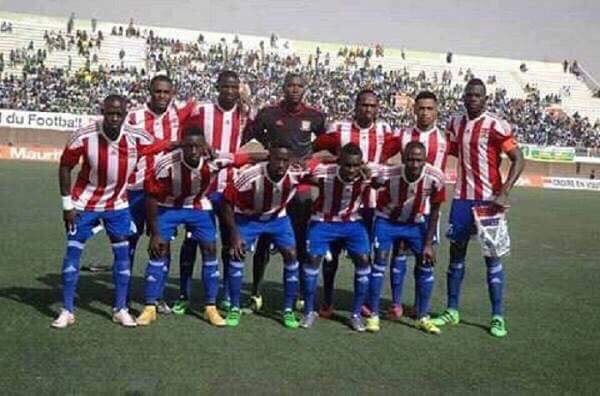




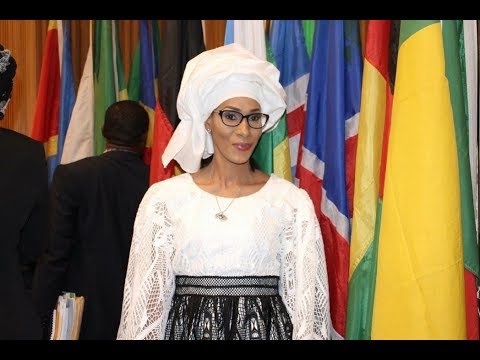
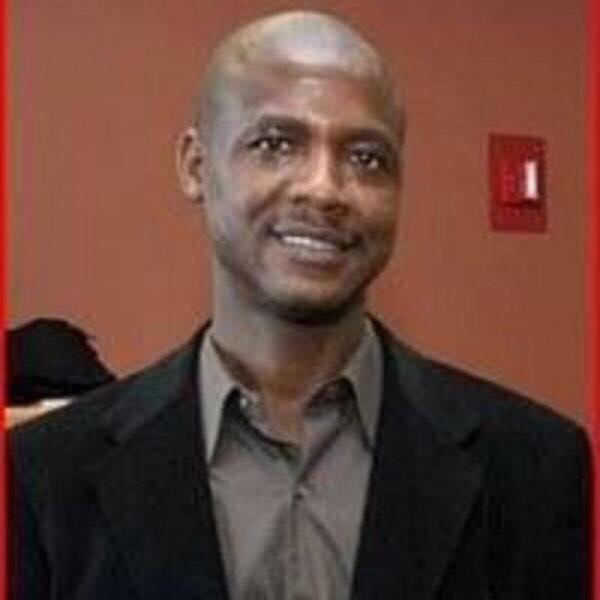
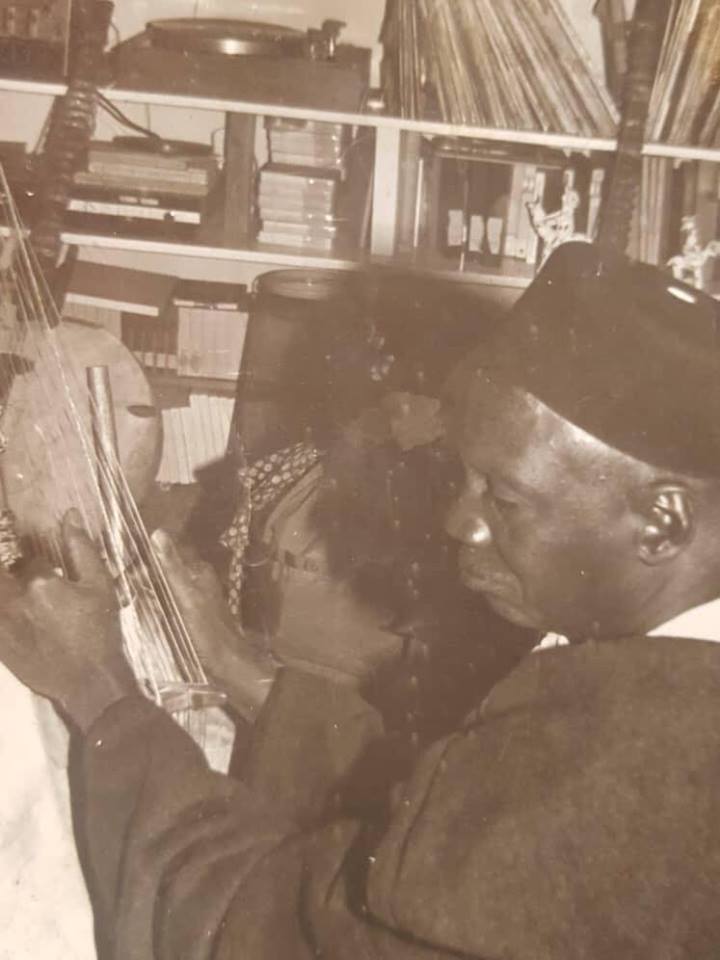
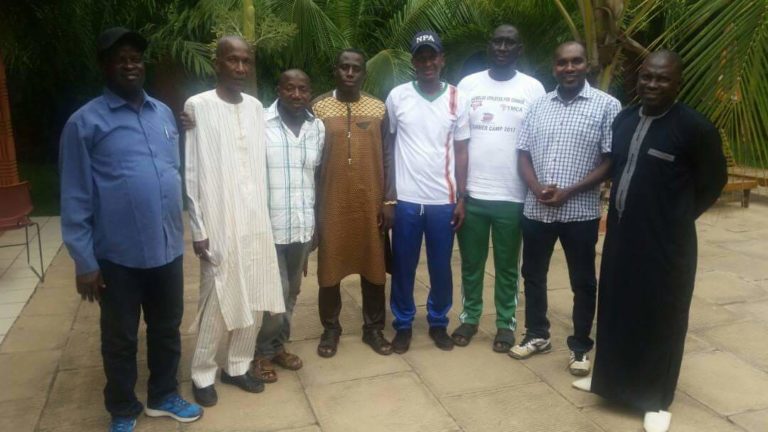
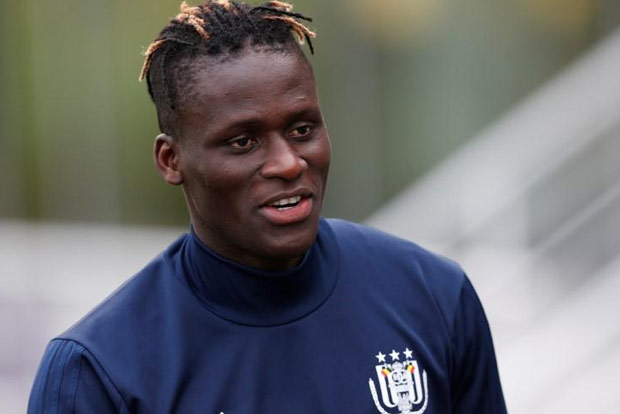





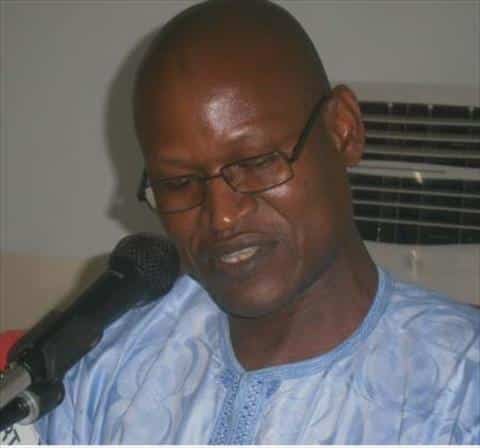
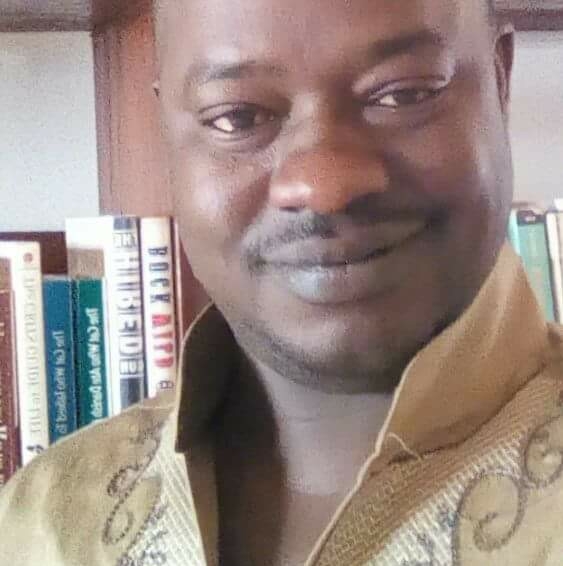
GPF Has New PRO
ASP Lamin Njie is appointed as the new Public Relations Officer of the Gambia Police Force following the departure of Superintendent David Kujabi who recently left to the United Kingdom to pursue Masters Degree in peace and conflict studies.
ASP Lamin Njie had previously served in this position until October 2016 when he left to the People’s Republic of Turkey to pursue Masters in Security Strategies Management and Superior Police Training Course.
I got enlisted into the Gambia Police Force in 2010 as Cadet Inspector and served at various units of the police including the Charge Office, Serious Crime Unit and Public Relations office. I wish to go on record to express my sincere thanks and appreciation to the IGP Alhagie Mamour Jobe, DIG and the entire management of the GPF for the trust and confidence bestowed on me while assuring that I shall give the best of myself continuing the noble task of developing a cordial relationship between the police and the public anchored in mutual trust, respect and confidence.
I wish to take this opportunity to call on the General Public, Business Community, NGOs, CBOs, CSOs, Youth and Women Associations, all relevant stakeholders both national and international to partner with the police force in its drive to institutional reform as well as the fight against crime and consolidation of democracy and rule of law.
i wish to thank the media fraternity for the extraordinary support with a promise to work on strengthening the already existing cordial relationship as media play crucial role in the success of policing endeavors, notwithstanding we urge the journalists to confirm or authenticate or clarify information through our office before publishing stories concerning the GPF.
Meanwhile ASP Foday Conta is the deputy public relations officer of the GPF.